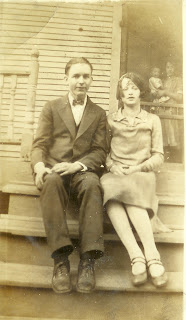
My grandparents, Rayford and Phoebe Huggins, were married on this day in 1926. He was 19; she was 17. Rayford was two hours late for the wedding, having forgotten the appointment while shooting pool with friends. Phoebe sat crying in her wedding dress, while customers of the lunch counter her parents ran out of their home on Mallory Avenue in South Memphis jeered at her and told her to change, because her groom would never show. Eventually, there was a knock on the door and Rayford stood there sheepishly, with his hands in his pockets and the question, "Well, do you still feel like getting married?"
They were together 61 years, until his death two days after Christmas, 1987. They raised three boys and had 6 grandchildren, but many more became their "children" through the concern they showed to the unfortunate. Papaw was a carpenter, while Phoebe was a Pentecostal preacher. Neither of them had more than an 8th grade education, but each had plenty of practical wisdom. Those who were down on their luck found a temporary home at Phoebe and Papaw's house, and many received gifts of food, clothing, and other help from them.
Temperamentally, they were quite different. Phoebe was a firecracker, and if you happened to differ with her on any point of scripture, she would preach a summary of the whole Bible to you right then and there, from Genesis through Revelations. Papaw sat quietly in his armchair and smoked his pipe. Phoebe didn't care much for his pipe (which he eventually gave up) but once, trying to be helpful, she washed all his pipes in dishwater and proudly presented his "cleaned" pipes to him when he came home from work.
Other surprises were even less convenient. Tired of urging him to remodel their kitchen, she simply tore out the back wall of the house one day while he was at work, and when he came home that night and entered the kitchen, he found himself looking into his own back yard. The kitchen was redone in short order.
They kept working into old age and were still accepting house painting jobs into their 70s. A ladder collapsed out from under Papaw and he took even this in stride, maintaining his balance and landing on his feet, unhurt. Phoebe and I climbed the steps of a fire ranger's observation tower once, when she was 65 and I was 21. I was the one who was out of breath; when I reached the top, she was standing there happily chatting with the ranger.
She frequented a senior citizens' center in her 70s, though not as a customer, but as a volunteer. It never occured to her that she was supposed to be elderly. I asked her once if they were coming to Memphis for Thanksgiving (they had moved to Heber Springs) and she said "Honey, I'd like to, but if I don't stay here, there's be no one to pay attention to the poor old senior citizens, so I need to stay and help."
After Papaw's death, Phoebe lingered until January 14, 1996, and would have lived longer but for a tumor that she purposely left untreated because she felt it showed a lack of faith in God to seek medical help. She let herself be taken to a hospital exactly once in her life (her three sons were delivered at home by midwives); about 3 months before her death, at 87, she was a patient for a couple of days at Methodist Hospital North. She couldn't get it through her head that she was supposed to lie quietly and let herself be cared for; she was constantly up and about, trying to help the nurses take care of others. Shortly, the staff realized that she couldn't be made to fit any model of convalescence they knew of and released her.
She saved everything and died still having among her possessions a paper container of peanuts and candy from my parents' wedding in 1951, the dress she had worn to their wedding, her diaries from the 1950s, and a parents' day program from Cummings School in 1940.
In 1958, she had bought a reel-to-reel tape recorder and left behind many recordings of family evenings including singalongs. My brother Tim found a machine of that type on eBay 10 years ago and made 2 CDs of family performances, for which I supplied names and dates. Today, I can hear Phoebe and Papaw, along with their three sons--my dad and his two brothers--and my great-grandmother, Amy Huggins, singing "If I Could Hear My Mother Pray Again," recorded one night in 1966, as well as my own voice at age 5, sounding like Alfalfa on "The Little Rascals," singing "Put Your Hand Into the Hand of God," and my brother David learning to talk. I can hear Phoebe preaching and playing "Under the Double Eagle" on her accordion. I can hear Phoebe and Papaw singing "When He Reached Down His Hand for Me." I can remember them driving my brothers and me to the little one-room church they pastored in St. Francis County, Arkansas, in a converted 1940s ambulance, with nothing so unnecessary as a seat belt. I can taste the salt pork that Phoebe would fry for breakfast and the pork neckbones that she prepared for supper.
Above all, I can hear her saying about some scoundrel, "He meant well." After their deaths, this became a standing joke in our family, and to this day, if we reflect on someone whose behavior seems particularly discreditable, someone will chime in with "Well, he meant well."
© Michael Huggins, 2011. All rights reserved.



